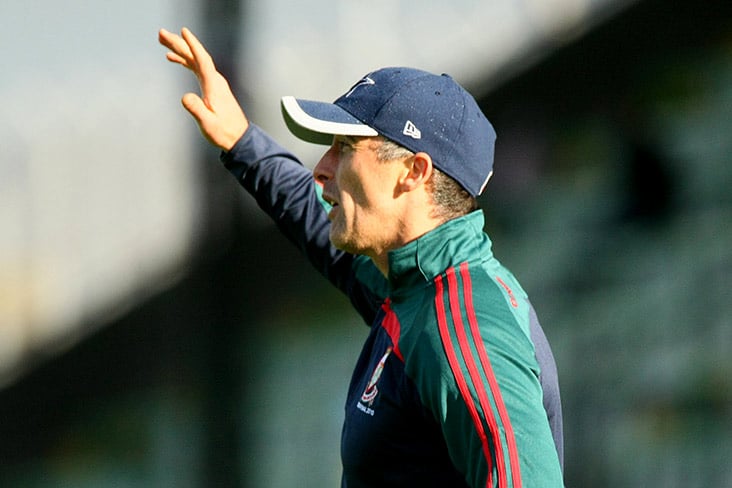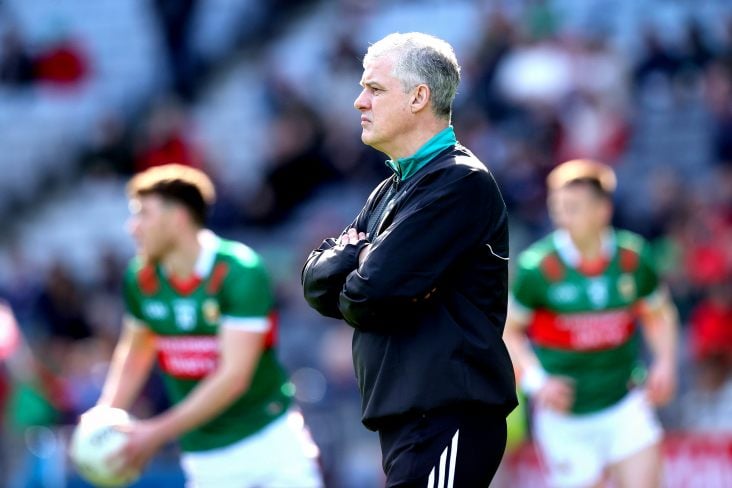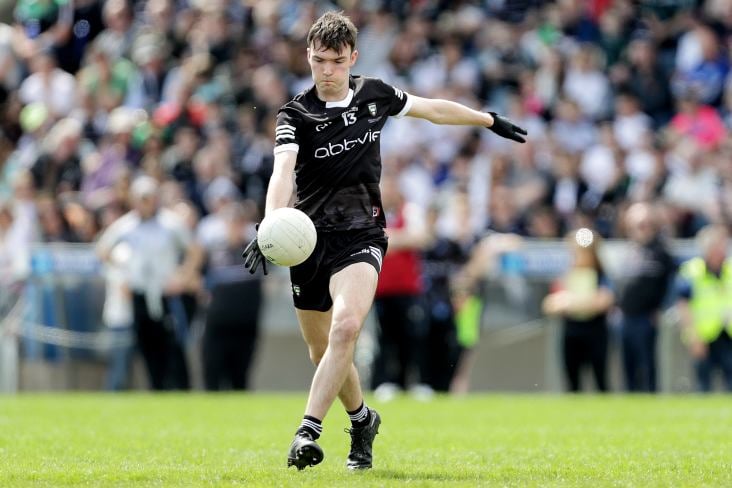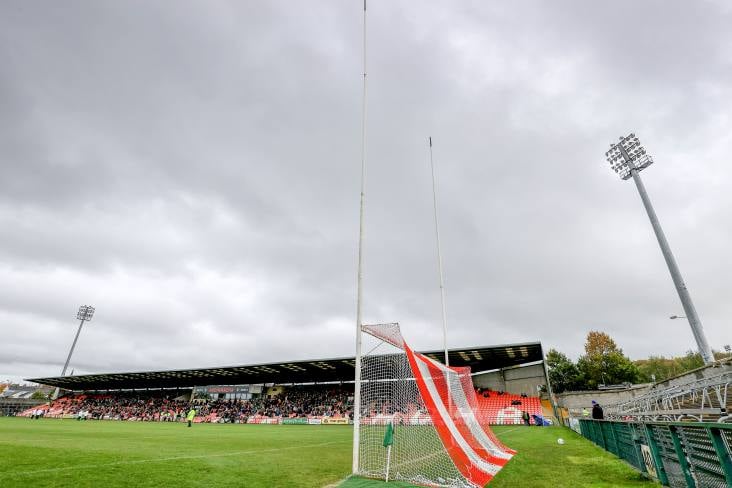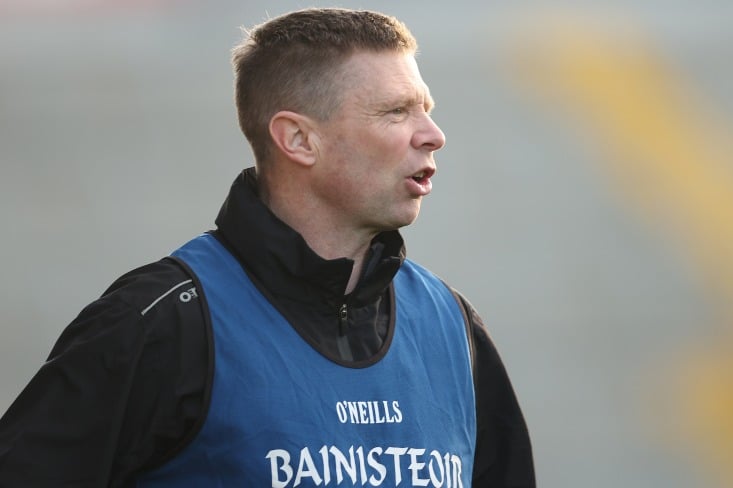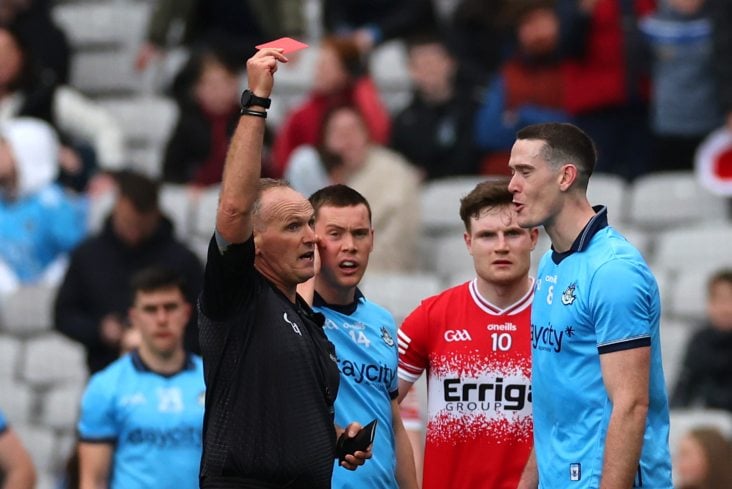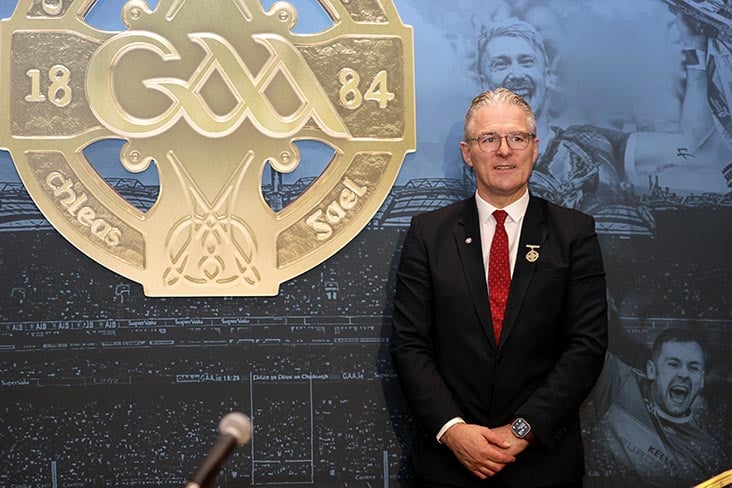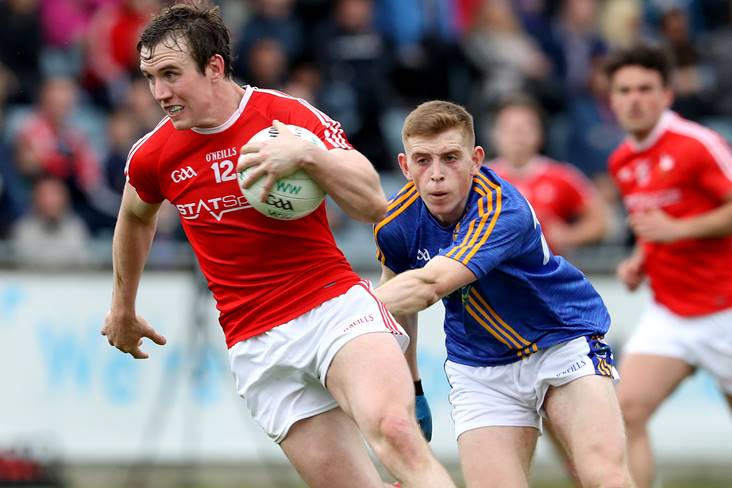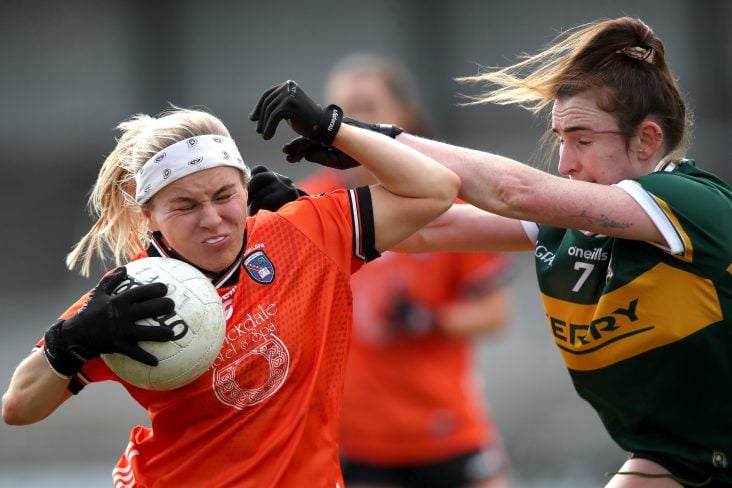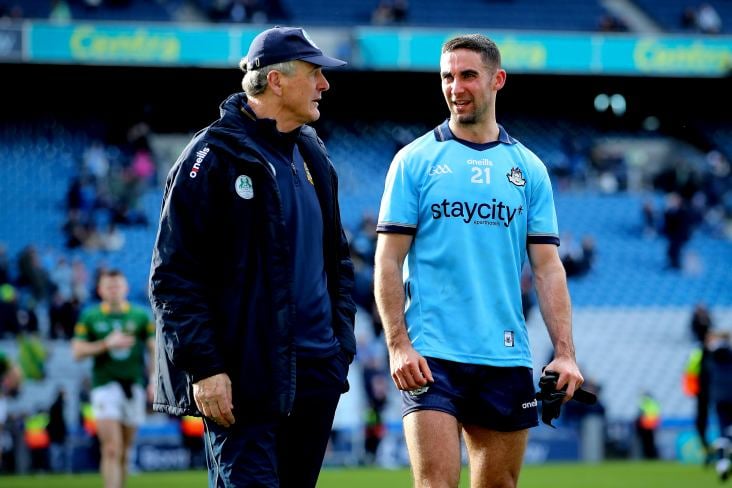Royal legend Peter McDermott passes away
October 11, 2011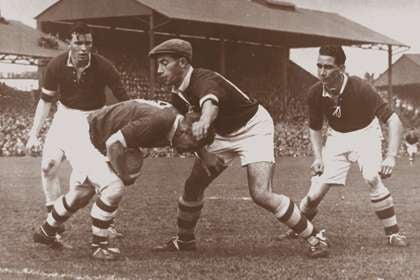
Meath attacking stars from left Mattie McDonnell, Peter McDermott (the man in the cap) and Brian Smith stop Cavan from clearing the ball.
Peter, who made his debut for the county in 1940, was a member of Meath's first All-Ireland winning side in 1949. He played in the 1951 and '52 finals before refereeing the 1953 All-Ireland final. The following year, 1954, he captained Meath to All-Ireland honours.
Two years later, he again took charge of the senior final as Galway defeated Cork.
He was a coach as Down claimed All-Ireland honours in 1960 and fulfilled the same role as Meath won the Sam Maguire in 1967.
He instigated the first tour by a GAA team to Australia when Meath travelled Down Under in 1968 and became Ireland's Compromise Rules manager in 1984 when Australia travelled to Ireland.
Peter served as Secretary and Vice-Chairman of the Meath county board.
Ar dheis Dé go raibh a anam
Funeral arrangements are: Peter's remains will repose at Fitzsimons Funeral Home Navan from 2.00-6.30pm (Wednesday) with removal to St Mary's Church for 7pm. The funeral Mass will take place on Thursday at 10am followed by burial in St Mary's Cemetery.
The following is an interview with Peter McDermott from the Meath Yearbook, Royal County, which was published in November 2008:
The Man in the Cap
No single article, irrespective of its length, can do justice to the amazing contribution Peter McDermott has made to the Gaelic Athletic Association as a player, referee, trainer, administrator and brilliant organiser during a lifetime of love for and dedication to the promotion of our games.
Watching this extraordinary, yet totally unassuming man make his way up and down Navan's Brews Hill over many years got the mind racing and always prompted one big question - how could one person have packed so much activity in so many different facets of the association into his life?
Producing a piece that will adequately acknowledge what has been a truly astonishing GAA life is challenging and it also carries its dangers. Peter took on so much responsibility and achieved so much in a vast variety of roles that it is very easy to forget certain events - prompting that inevitable and dreaded tap on the shoulder from the person who knows everything, followed by a reminder of what you should have mentioned.
The safest thing is probably to start at the beginning, which was 1918, when Peter came into the world. The McDermott family originated in the Cushinstown area, but Peter was born in Belgooley, near Kinsale, Co Cork, where his father William had taken up a position on an estate.
The family later moved to Blanchardstown and then back to Cushinstown. Peter attended Mulhuddart (briefly) and Cushinstown schools and among those he came into contact with in the latter were the Haugheys who lived at The Riggins, near Greenpark - among them young Cathal who was many years later to become Taoiseach Charles J. Haughey.
"I used to carry him on the handlebars of my carrier bike when I'd be going to collect eggs in The Riggins," Peter recalled. "I was in the same class as Maureen Haughey. Cathal was more or less an infant.
"They came to school by donkey which they would leave at a house next to the school. They had a long journey home. When Mrs Haughey heard about Cathal getting lifts on the handlebars of the bike she put her foot down. Flying down Painstown Hill was dangerous!"
Peter started playing football at juvenile level with Curraha and Ardcath and then lined out with Rathfeigh, captaining them to Minor Championship honours in 1936 in their unusual blue and yellow horizontal stripes. That team, made up of players from a wide area, broke up after a couple of years and there has never been a team in Rathfeigh since.
"We had half of county Meath," he said. "They were from everywhere and none of them were minors. Dads Army!"
He once played for Skryne in a friendly game at Seneschalstown, but opted to join Donaghmore after the break-up of Rathfeigh. He had developed a strong friendship with Jackie Maye through juvenile football and it was in his years with Donaghmore that Peter really began to develop as a player.
He played with the Meath juniors for a number of years and was part of the side which reached the Leinster JFC final in 1939. They looked set to secure the title until Dublin struck with a late equalising goal to force a replay which they won comfortably to deny the Royal County the title.
He wasn't part of the Meath senior panel that year when they reached the All-Ireland final under the captaincy of Mattie Gilsenan and lost to Kerry.
"I was unlucky with the Meath juniors in 1939," Peter said. "We drew with Dublin in the Leinster final at Newbridge. We should have won, but a goalkeeping error led to Dublin scoring a late equalising goal and they beat us easily in the replay at Naas. That was a Dublin senior team in the making.
"I remember Kevin Devin colliding with an upright in the replay and it broke. That replay didn't go well for a lot of us and I didn't make the Meath senior panel for the All-Ireland final."
Peter, who reckons he played his best football during the restricted war years, made his senior debut in the spring of 1940 in a National League semi-final against Wexford which Meath won, before losing the final to Galway.
"I made my senior debut in a league semi-final against Wexford at Navan in 1940," he added. "Kevin Smyth made his debut that day too. We won, but lost the final to Galway. They had a very good team then. I was supposed to have played very well against them.
"We won the Leinster Championship that year in my first year on the senior team. We beat Laois in the final and I was moved out to mark Tommy Murphy. I had a hell of a game on him. That was the first of six Leinster Championship medals I won."
So many big days followed which brought triumphs and disappointments and a massive amount of memories. Peter's first experience of football at All-Ireland level followed that 1940 Leinster success when he played at midfield in the semi-final against Galway which Meath lost by six points.
After securing his second provincial medal in 1947, a trip to New York for an All-Ireland final at the Polo Grounds looked a distinct possibility, but that dream trip wasn't to be as Kerry beat them at the penultimate hurdle, before losing the decider to Cavan.
"It was a big regret not getting to that final," he said. "If we had met anybody other than Kerry in the semi-final we might have got there. A lot of things went against us at that time and Kerry had a brilliant team. I was one of the few outsiders present when Cavan came back and received the Sam Maguire Cup in the Gresham Hotel. The cup wasn't brought to America. I don't think Cavan captain John Joe O'Reilly was there.
"There was compensation for me that year when Young Irelands (a team from the Bellewstown/Cushinstown area) won the Junior Championship. We beat Moynalty in the final after a replay. They included Mattie Gilsenan."
A huge highlight came in 1949 when Meath won their first All-Ireland SFC title as a team captained by Brian Smyth defeated Cavan in the final, but there were disappointments to follow in the shape of final defeats - against Mayo in 1951 and Cavan, after a replayed final, in 1952.
"We came out of nowhere to win it in 1949," Peter said. "I remember we weren't able to field a team in a National League game against Westmeath in Kells. But we came through three games against Louth on the way to winning the Leinster title.
"Winning the All-Ireland was marvellous. Bill Halpenny got the goal in the final against Cavan. It was a tap in. I remember one of his daughters saying 'I would have scored that myself'. The day after the final we flew over parts of the county in a 28-seater Dakota plane. Jimmy Dargan from Ballivor was with Aer Lingus and I suggested the idea to him. He organised it.
"We could see very little and the pilot didn't know much about Meath because we headed out over Bray. We later crossed over Pairc Tailteann. We thought we would have a great view, but we didn't. John Newman had a habit of losing hats and when it went missing that day the joke was that it had fallen out of the plane."
It was subsequently that the McDermott involvement in All-Ireland senior finals became truly astonishing. He had taken charge of the 1951 minor decider between Roscommon and Armagh and despite a lack of experience at inter-county level he was chosen to referee the 1953 senior final between Kerry and Armagh, having played in the '51 and '52 deciders.
The '53 final was the day of the penalty which Armagh's Bill McCorry missed. Armagh argued that it was a goal, but Peter has never had any doubts that he got it right. The Kingdom won by four points.
A year later, while amazingly also in the position of County Board secretary and a selector, he had the unique distinction of playing in an All-Ireland senior final after refereeing one - and what's more he captained rank outsiders Meath to a six-point victory over Kerry.
By then he was almost 36 and undoubtedly one of the oldest captains of an All-Ireland-winning team. He had been playing senior inter-county football for the best part of a decade and a half and was in semi-retirement, coming on as a substitute in the Leinster final against Offaly earlier in the summer and playing a crucial role in the three-point win.
"I was an accidental captain in 1954," Peter said. "Tom Duff broke his leg in the Leinster final against Offaly. I came on as a substitute and scored two goals. Tom's misfortune was my good fortune. O'Mahonys had won the Senior Championship in 1953 and the champions could nominate the captain.
"Naturally, being captain was fantastic. There's no greater honour than lifting the Sam Maguire Cup. We were rank outsiders for that final. Collective training had been abolished and that didn't suit Kerry.
"Looking back at it, I didn't have great games in finals. I contributed to vital goals, but I couldn't say I was satisfied with the way I played. I played better in the finals we lost."
By the time his inter-county playing days came to an end Peter had made 51 Senior Championship appearances for Meath - a record which wasn't equalled until the 10-match saga in 1991 helped Colm O'Rourke to join him on that number. The Skryne player hit the front when he lined out against Laois at Pairc Tailteann the following summer.
A year after captaining the triumphant Meath team in 1954, Peter refereed the two All-Ireland senior semi-finals in '55 - Kerry versus Cavan and Dublin versus Mayo - which both ended in draws. Both replays were played on the same day and he took charge of one of them (Kerry versus Cavan) after declining a request to referee both.
The great respect in which he was clearly held as a referee was in evidence again in 1956 when he took charge of the senior final in which Galway defeated Cork. On the domestic front he refereed county finals while still playing.
"I had the unique distinction of playing in an All-Ireland final after refereeing one," Peter commented. "Refereeing an All-Ireland final is more pressurised than playing in one, especially when it's close.
"Refereeing is the worst job in the world. You only have a split second to make a decision. As for nowadays, I'm not into these yellow and red cards and, as for timing, why don't they introduce a clock."
It's difficult to comprehend that for many years Peter - christened 'The Man In The Cap' by legendary commentator Micheal O'Hehir - combined his playing career at inter-county, club and sometimes inter-provincial level (he won a number of Railway Cup medals) with refereeing, administrative roles and business commitments as an egg merchant.
His playing days at inter-county level also brought National League medals in 1946 when Wexford were beaten in the final and in 1951 when Meath defeated New York in the decider at the Polo Grounds. They had departed for the United States only two days after losing the All-Ireland final to Mayo. Significantly, Peter scored six goals during that league campaign.
Apart from his term as County Board secretary from 1952 to 1955, Peter also acted as vice-chairman for a spell. He was Central Council delegate in 1945 and 1946 and was on Leinster Council in 1946 and from 1948 to 1952. He lost to Fr Pat Tully in a vote for the position of Leinster Council chairman in 1949 - the year he helped Meath to that breakthrough All-Ireland senior success.
"I was stone mad," he said of his varying roles. "I don't know what was wrong with me to want to do those things. I had no education. I only went to Cushinstown school. It was straight onto the lorries after that, collecting eggs."
Of course, it's at club level that a player gets the opportunity to be spotted and elevated to the county set-up. Peter's career really took off with Donaghmore and they earned the right to play senior football when they defeated Oldcastle in the 1938 Intermediate Championship final.
Four years later they secured the SFC title when a team captained by Peter got the better of Skryne by 1-8 to 0-2 in the 1942 decider which was played at Pairc Tailteann on 1st November. Interestingly, brothers Tony and Pat 'Red' Donnelly played on opposing teams in the decider. They had gone their separate ways following the break-up of the Kilmessan team and Tony was part of the triumphant Donaghmore side.
Other points of interest from that final all of 66 years ago were that a 17-year-old youngster called Paddy O'Brien, who was later to become one of the greatest full-backs the game of Gaelic football has ever seen, played at right corner-forward for Skryne, making his championship debut at that level. Tommy 'Boiler' McGuinness, who had lined out at full-back in the 1939 All-Ireland final against Kerry, was alongside him at full-forward.
"My first game for Donaghmore was against a team called The Wild Geese from Oldtown," Peter recalled. "Donaghmore won the Intermediate Championship in 1938. We beat a very strong Oldcastle team in the final.
"We won the Senior Championship in 1942. I think there were only three or four teams in the competition that year. Duleek beat us in the 1943 final, but they've never won it since."
Peter married Bridie Kelly from Ashbourne in 1950 and they moved to Navan - hence his subsequent involvement with Navan O'Mahonys. He helped the Brews Hill club to win their first Senior Championship title in 1953 when Tony McCormack became the initial recipient of the Keegan Cup.
By the time O'Mahonys regained the famous trophy and commenced their fabulous five-in-a-row of senior title annexations in 1957, Peter's career was coming to an end and he lined out in goal in the final against Skryne. That was his last game of football in a truly astonishing playing career.
Peter also played club hurling and pointed out that his father was a very good hurler with Dunshaughlin. Peter played in a Senior Championship final for Oberstown against Trim in the 1940s and suffered a double blow - defeat and a broken nose. He was also on the losing end in a junior final while playing for Ratoath against Kildalkey.
He fondly recalls being present for the three matches between Cork and Kilkenny which it took to decide the 1931 All-Ireland final, before Cork triumphed at the third attempt.
Of course, there was also Peter McDermott the coach/advisor. He was a guiding force behind Down's All-Ireland Junior Championship success in 1946 while also a key player with the Meath seniors and 14 years later assisted the Mourne men when they made the breakthrough at senior level. He watched the drawn 1960 All-Ireland semi-final between Down and Offaly from Hill 16 and afterwards was approached about taking on the coaching duties.
He accepted and Down won the replay, before earning the first of back to back Sam Maguire Cup successes when a team captained by Kevin Mussen defeated Kerry in the final.
Peter became Meath senior coach in 1966 when they won the Leinster title thanks to a narrow final win over Kildare and scored a runaway victory over Down in the All-Ireland semi-final, but lost the final to Galway.
He was still at the helm when the county won a third All-Ireland senior crown the following year with a final win over Cork. The Leinster title had been retained with a final victory over Offaly.
"That 1967 team contained some great players," he said. "It was tremendous to win it.
"But today there's too much emphasis on coaching. It's a lot of bull. It's really about the way the ball drops. You can make switches if you're a good judge. Meath used to have seven selectors. It was daft. You couldn't get a unanimous decision."
The following year he was one of the main organisers of the historic trip Down Under - a massive undertaking which was immensely successful on and off the field of play. An Aussie Rules' team had played Meath at Croke Park in October, 1967 and the return trip by a party of 32 players and officials in March of the following year is still talked about with great fondness to this day.
Peter, who also coached the trailblazing visitors, penned a fabulous account of the entire adventure titled 'Gaels In The Sun'. He had previously demonstrated his writing ability as a regular contributor to GAA columns in the 'Drogheda Independent'.
"The man who made that tour go so well was travel agent Joe Walsh," Peter acknowledged. "He was super, a marvellous man. It was a trip ahead of its time and a great experience. The fellows were so well behaved and they performed so well in all the games."
When the link with Australia was revived Peter was Irish manager for games against the Aussie Rules' professionals in Cork and Croke Park in the GAA's centenary year of 1984.
Obviously, he played with and against some outstanding footballers.
"Tony Donnelly was my hero," he stressed. "He was like Johnny Giles. He could put the ball on a sixpence. He was ahead of his time. Louth's Eddie Boyle and Mayo's Paddy Prendergast were other great players."
Peter has been the recipient of countless awards and accolades, including inclusion on the All-Time All-Star selection in 1989. He entered the Co. Board's Hall of Fame in 1990 in recognition of his amazing service to the county in so many roles and is an honorary president of the board.
This paragraph from the late Colum Cromwell's book 'Golden Wonders" just about sums it all up: "I'm glad to have got to know the great Peter McDermott very well down the years. A half hour in his company is something to be cherished. A whole day like I had on various occasions like at Ulster finals in Clones or a Munster hurling final in Thurles is even more special. Thanks Peter." Tweet
